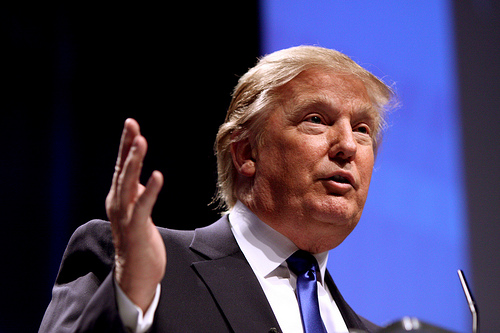
Trump and the triumph of unreason

In
“I am so attached to [the cause] in my heart, and I am so convinced that God our Saviour must embrace it as His own cause, that I cannot be dissuaded. Nor can I accept or believe the contrary”. That was how the Spanish king Philip II answered his advisors when they tried to convince him not to invade England, suppress the revolt in the Netherlands and make war against the Ottoman empire all at the same time. The result of the king’s hubris is well known. The Spanish armada was sunk in the Channel, the Seventeen Provinces became independent; only the Ottoman expansion was, temporarily, halted.
(Photo credit: Gage Skidmore, Flickr)
*****
Trump and the triumph of unreason
“I am so attached to [the cause] in my heart, and I am so convinced that God our Saviour must embrace it as His own cause, that I cannot be dissuaded. Nor can I accept or believe the contrary”.[1] That was how the Spanish king Philip II answered his advisors when they tried to convince him not to invade England, suppress the revolt in the Netherlands and make war against the Ottoman empire all at the same time. The result of the king’s hubris is well known. The Spanish armada was sunk in the Channel, the Seventeen Provinces became independent; only the Ottoman expansion was, temporarily, halted.
Strategy is about making rational choices based on facts. The evidence from strategic history is clear: those who ignore the facts and allow religion, ideology or emotions to determine strategy instead, lose.
To quote an example that is closer to our own age: the American invasion of Iraq in 2003 had nothing to do with reason and facts. The “neocons” wanted to bring down Saddam Hussein, and that was that. The facts were just adapted to fit that ideological choice. Surely Saddam would have had something to do with al-Qaeda and “9/11”. If not, he would be bound to be developing weapons of mass destruction. And when that turned out not to have been the case either, it suddenly had been all about democratization from the start. By then, the Middle East had sunk into chaos.
Trump’s decision to pull the US out of the nuclear deal with Iran is of the same kind. Of course the Americans know that Iran actually upheld its part of the agreement. But that’s not the point. The White House has made an ideological decision: Iran is the enemy. The fact that its strategy will only serve to increase instability in the region, doesn’t matter in the decision-making process.
The same holds true for the tariffs on European (and Canadian) steel and aluminium that Trump introduced, “for reasons of national security”. The fact that the American corporate sector itself has warned that with this strategy everybody will lose, doesn’t come into it. In the economic realm, we too, for ideological reasons, have been dubbed enemies.
The problem is that if a strategy doesn’t have a rational basis in the first place, rational arguments have no effect. When the facts prove that a strategy doesn’t work or even has the opposite effect from the one intended, leaders who are blinded by religion or ideology usually react not by changing their strategy, but by pushing it through even more radically. Until total failure leaves them no other choice but to change course.
Like Napoleon in Russia: win one more battle, conquer one more city, conquer Moscow, and the Russians must give in. Well, they didn’t. To make another, more daring comparison: that’s how one ends up alone in a bunker in Berlin, clueless because the facts refused to align with your worldview.
That’s what makes it so difficult for the EU to react to Trump today. For a start, the US obviously is not our enemy. The EU must avoid escalation, for that will only make things worse. But not reacting at all isn’t an option either. Trump would jump on that as evidence of the rightness of his view: see, they already give up, because they know they’re wrong.
Europe must remain a reasonable actor in world politics. Reason always wins. But it may take a while.
Prof. Dr. Sven Biscop, an Honorary Fellow of the European Security and Defence College, is a professor at Ghent University, and directs the Europe in the World Programme at the Egmont – Royal Institute for International Relations in Brussels.
[1] Quoted in Geoffrey Parker, The Grand Strategy of Philip II (Yale University Press, 2000).